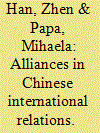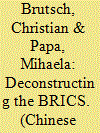|
|
|
Sort Order |
|
|
|
Items / Page
|
|
|
|
|
|
|
| Srl | Item |
| 1 |
ID:
179948


|
|
|
|
|
| Summary/Abstract |
What are Chinese views of international security alliances? Some scholars argue that the idea of alliance formation has become obsolete in contemporary international relations (IR), while others predict that China will eventually return to alliance formation, as major power competition intensifies. This study analyzes 1,403 articles addressing China’s foreign relationships published in the top five Chinese IR/political science journals between 1990 and 2019. We use automatic content analysis to identify key concepts and measure trends in Chinese alliance thinking. Our findings challenge the view that alliances are obsolete in contemporary Chinese IR. Alliance debates have increased in prominence during Xi’s administration. Since the 1990s, however, the partnership concept has emerged as an alternative to the alliance concept. We examine the application of these concepts through cases of China’s relations with the United States, Russia, and India.
|
|
|
|
|
|
|
|
|
|
|
|
|
|
|
|
| 2 |
ID:
123759


|
|
|
|
|
| Publication |
2013.
|
| Summary/Abstract |
Can the BRICS (Brazil, Russia, India, China, and South Africa) build on their momentum to transform the international order, or will they be remembered as a geopolitical fad? To assess the prospects of the figurehead for emerging power aspirations, this article examines the associational dynamics and practices that inform their collective journey. Drawing on the rationalist literature on bargaining coalitions and on the constructivist literature on 'imagined' communities, we develop an analytical framework to investigate whether states exploit their BRICS affiliation tactically, to rise in tandem, or strategically, to rise together. Two case studies, which examine BRICS efforts to curb Washington's 'exorbitant privilege' and to develop a collective response to the climate crisis suggest that even when the BRICS share soft revisionist goals, coalitional cohesion and community formation are tentative at best. In the absence of clear common objectives, the BRICS abandon all but the rhetoric of coalitional behaviour. We conclude that unless the five emerging powers agree on a coherent strategy to harness their relative strengths, the BRICS' geopolitical play will be defeated by their own tactical ploys.
|
|
|
|
|
|
|
|
|
|
|
|
|
|
|
|
| 3 |
ID:
178088


|
|
|
|
|
| Summary/Abstract |
In its Eurasian diplomacy toward Russia and China, India has preferred to engage these states bilaterally and through the Brazil–Russia–India–China–South Africa (BRICS) and Shanghai Cooperation Organization (SCO) multilateral alignments. By contrast, India views the Russia–India–China (RIC) triangle as a less effective mechanism. However, despite its ongoing militarized crisis with China in the spring/summer of 2020, India surprisingly agreed to participate in a meeting of RIC foreign ministers and initiate RIC defence ministers' engagements. India also initiated the revival of RIC summits in 2018. This article analyzes the drivers for India's recent shift toward enhancing RIC. Drawing upon Indian policy statements and alignment documents, the article firstly argues that India generates policy agenda overlaps across RIC, BRICS and SCO, which facilitate forum-shopping. Introducing the case-study of Indian counterterrorism diplomacy across the three alignments, the article secondly argues that Indian dissatisfaction with its progress in advancing a security policy agenda within one grouping leads it to refocus on building this agenda in alternative alignments. This article contributes to conceptualizing multi-alignment management, while providing new insights into Indian relations with Russia and China within multilateral institutions and diplomacy in the era of regime complexity.
|
|
|
|
|
|
|
|
|
|
|
|
|
|
|
|
| 4 |
ID:
189269


|
|
|
|
|
| Summary/Abstract |
Russia led a key Cold War alliance and is now at the forefront of debates about major power realignments. Yet Russia’s own conceptualization of alliances in the post-Soviet era has received scant attention. How do Russian policymakers and academics view Russia’s post-Cold War alliances: Are they obsolete, or are they still used for cultivating strategic relationships? We examine the Russian conceptualization of alliances through a systematic study of Russian policy documents and academic debates between 1991 and 2019. We find that traditional alliances are considered ineffective and defense commitments have declined. However, we challenge claims that alliances are obsolete and that alignments/multivectorism have replaced them. Russian regional alliances are cultivated for new purposes and coexist with various other institutional forms. We conceptually map Russia’s close relationships and argue that alliance scholarship needs to move away from a single entity focus toward conceptualizations based on institutional choices.
|
|
|
|
|
|
|
|
|
|
|
|
|
|
|
|
|
|
|
|
|